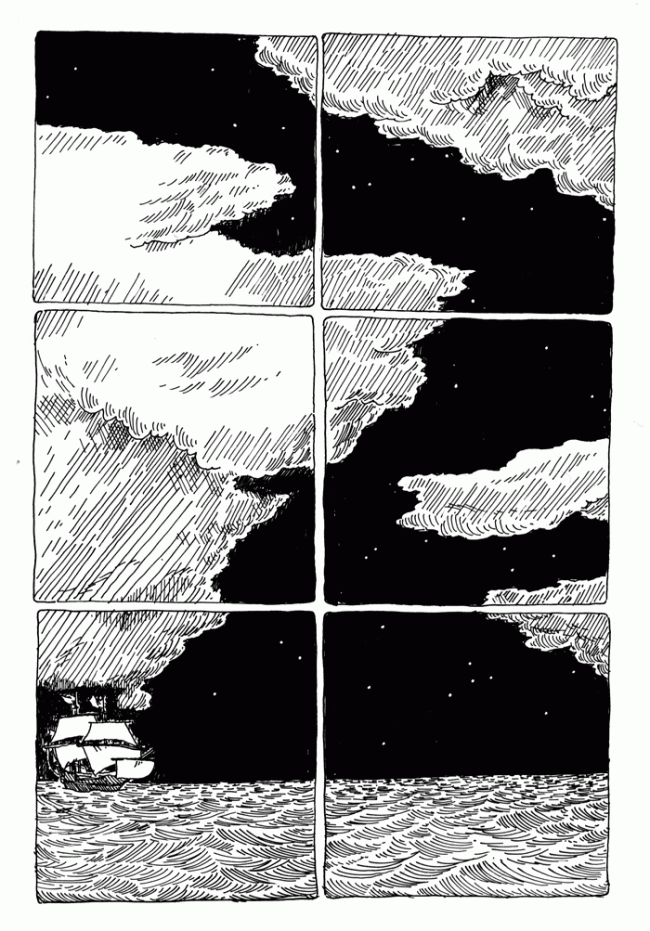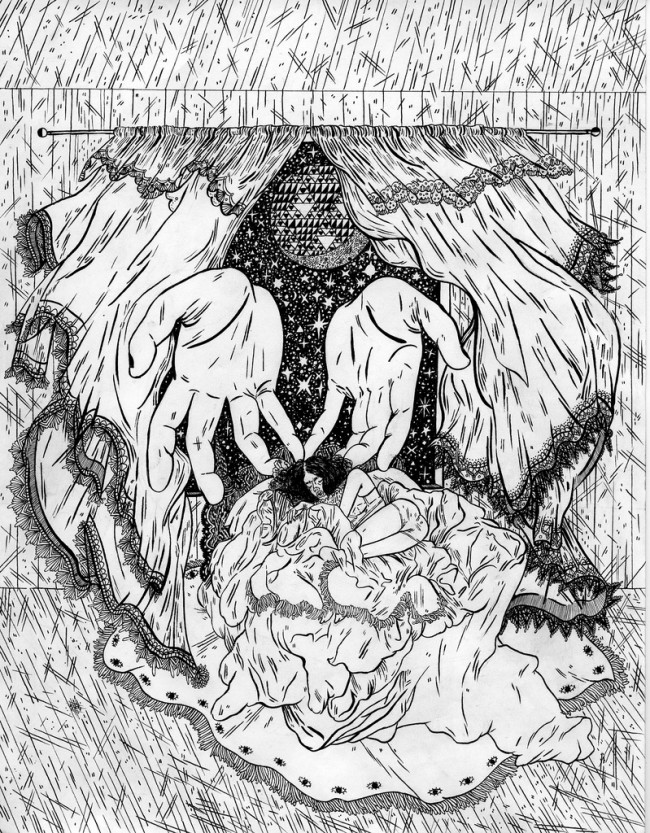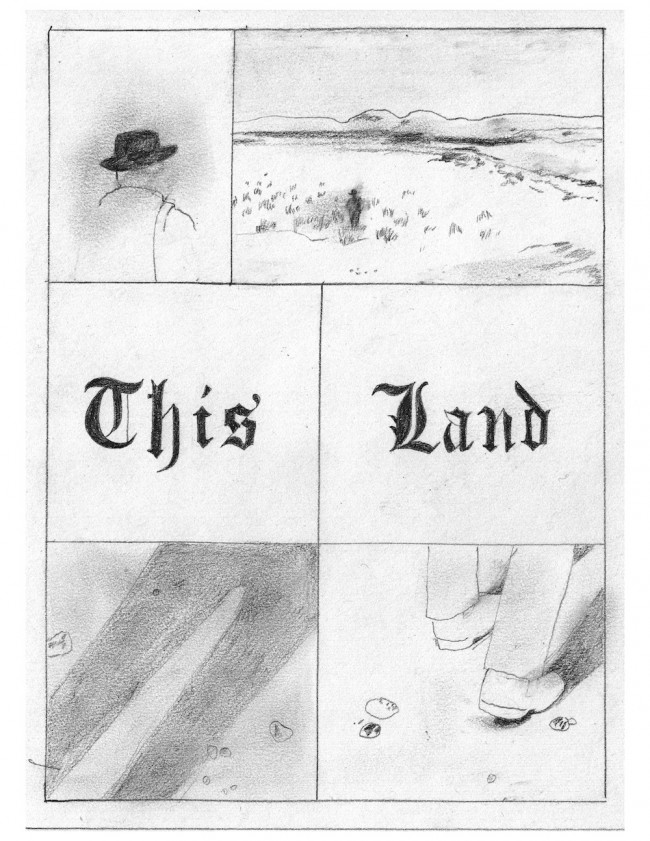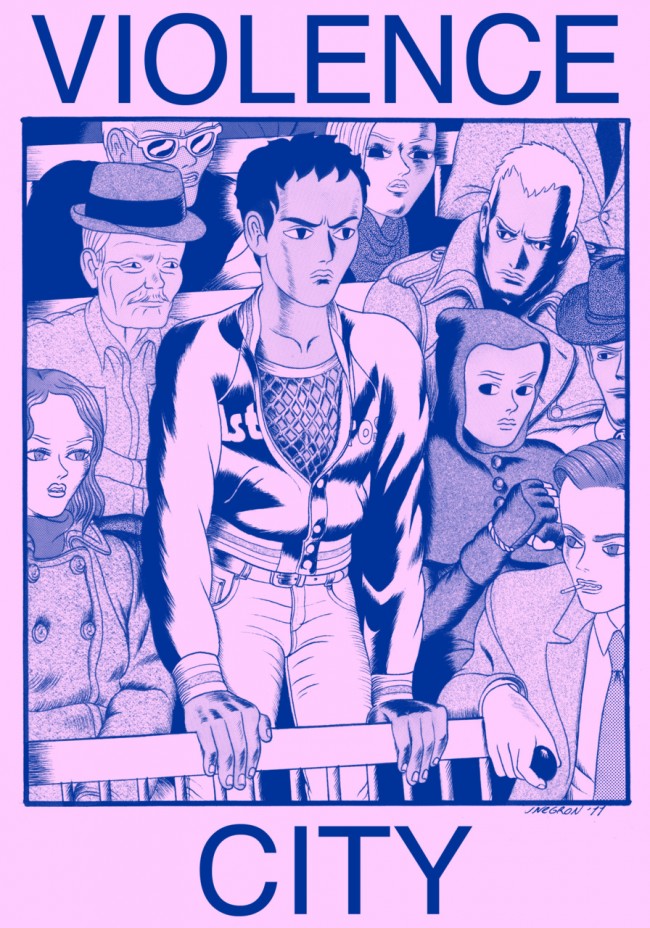Posts Tagged ‘The Comics Journal’
Comics Time: Black Is the Color
March 21, 2013Say Hello, Heather Benjamin!
January 24, 2013I interviewed the great Heather Benjamin of Sad Sex fame for my column at The Comics Journal. Very excited about this one.
Say Hello, Aidan Koch!
December 17, 2012I interviewed Aidan Koch for my column about up-and-coming cartoonists at The Comics Journal. Her comics are a knot of unusual artistic impulses that it’s a pleasure to untangle.
Say Hello, Uno Moralez!
August 16, 2012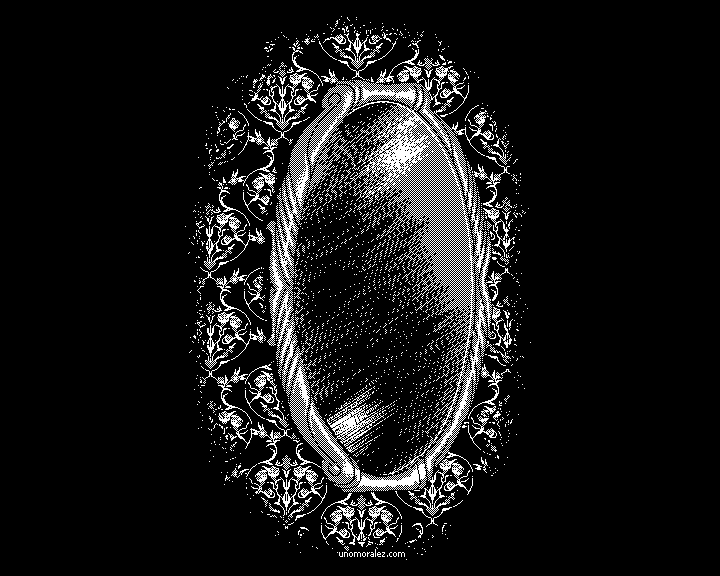
I interviewed Uno Moralez for The Comics Journal. He’s one of my favorite working cartoonists, and this is his first English-language interview.
16 thoughts on the Comics Journal/Kickstarter/SP7 fight
July 30, 2012In his capacity as co-editor of The Comics Journal, Dan Nadel (who is also publisher of PictureBox Books, co-organizer/curator of the Brooklyn Comics and Graphics Festival, and an important anthologist/historian/editor) tore apart virtually every aspect of SP7, a tribute to the influential Japanese alternative-manga anthology series Garo for which editors Box Brown and Ian Harker have established a Kickstarter fundraiser. This has led to the most impassioned argument among alternative comics people I’ve seen since back when I started reading the Comics Journal message board in 2001. Here are my thoughts on it.
1. I’m having a really hard time figuring out which side of this argument is the cool side to be on. Does anyone know? Because I’m on that side.
2. In a single post, the Comics Journal’s three-decade reputation for temperate rhetoric is RUINED.
3. I am actually glad this is what we’re arguing about today, instead of just sticking the boot into obviously bad and unethically made superhero comics again. For one thing, those comics don’t need the press. For another, the issues we’re talking about, the comics and creators and editors involved, they are actually vital to the art form. They can stand to be argued about passionately.
4. Dan’s ersatz editorial is clearly the product of months or years of pet peeves given voice in straw-that-broke-the-camel’s-back fashion, and as such is riddled with inapt or inept elements that a calmer and more considered approach to this post would probably have caught and eliminated. The thing about spelling “comix” with an “x” is pedantic and childish; the claim that EC Comics didn’t influence the undergrounds in a substantial way is plain wrong in a way that even Dan’s co-editor Tim Hodler caught immediately; much of the argument about how Brown and Harker are misreading Garo particularly and manga generally requires the absolute least charitable read of what they’re saying, to an extent that strains credulity; it’s kind of funny that he spells Bryan Lee O’Malley’s name wrong while decrying the sloppiness of his targets’ writing; and so on. Don’t blog angry!
5. The strange thing about doing a Garo tribute anthology is that you’re doing a tribute to an anthology, which is definitionally a whole range of comics (genres, styles, tones) by a whole range of creators rather than one particular set of visual and narrative and philosophical characteristics you can point to and say “there, that’s what we’re paying tribute to.” If the idea is to pay tribute to the way the various kinds of comics in Garo, a whole range of approaches that roughly map to “alternative comics” here in the English-speaking world, broadened the possibilities available to Japanese comics readers and makers, wouldn’t the best way to do that be to simply make a broad range of thoughtful, progressive comics? It’s entirely possible that that’s what this will be, with zero fetishization of Garo qua Garo, but if so it’d almost defeat the purpose — you could slap the word Garo on any collection of thoughtful, progressive comics. It’s like, no one thinks to do a RAW tribute anthology, because the influence of RAW was internalized and dispersed throughout all of alternative comics. Alternative comics is a RAW tribute anthology.
6. That said, I like Ian and Box personally, and as editors. (I like Dan personally, and as an editor of both comics and criticism, too. I’m a lot closer to Dan on both points, honestly.) I like many of the contributors here. The book’s Kickstarter isn’t something I’d contribute to because I’m not familiar with Garo and would mostly prefer to see the contributors do their own things in their own settings, but it’s something I’d probably pick up at a show.
7. I was surprised to see the discussion really quickly escalate into open anti-Nadel backlash. I probably shouldn’t’ve been. Dan is a gatekeeper four or five times over: He’s the publisher of one of the only mid-’00s artcomix publishers still standing. He’s the co-founder and arbiter of a curated festival that has absolutely kept cartoonists at the gates based on his taste. He’s the co-editor of the alternative comics criticism publication of record. As an editor/anthologist/historian he’s helped broaden, or suggest an alternative to, the comics canon, depending on how you want to look at it. He’s the post-alternative generation’s most prominent straddler of the line between comics and the fine art world. If you’ve ever felt rejected or neglected by him in any of these guises, it’s knives-out time, because nothing fires comics people up more than “you think you’re better than me?!”
8. That’s not to invalidate all the complaints, of course. Though all, literally all, of my personal and professional interactions with Dan have been delightful and enriching to me as a comics person, I have to imagine he’s been an unfair dick to people from time to time, since we all are. Moreover there are people in comics for whom a rejection by Dan in whatever capacity, however honestly and fairly arrived at by Dan, really would hurt, career-wise.
9. If you’ve ever followed any of the online feuds in which Dan’s been involved, or if you’ve ever talked to him about the work of other editors and publishers, the throughline that emerges is that Dan takes the presentation and contextualization of work very, very, very, very, very, very seriously. I’m paraphrasing this, but one thing he said comes back to me any time I look at an archival reprint project: For the vast majority of cartoonists, you only get one shot at this. If your work in reprinting comics, or writing about them in your book’s backmatter, or the context you provide for them w/r/t other cartoonists and movements in comics, is sloppy, that’s not just about you — from now on anyone who encounters these comics will encounter them with that sloppiness as their lens into the work. You owe it to the readers and the cartoonists alike to be rigorous, serious, sensitive, informed, insightful, and otherwise good at your job. If you strip away the excesses of rhetoric and the Kickstarter stuff, that’s his concern about SP7 and its presentation of Garo. It may be a lot to read into what is effectively sales copy, the Kickstarter description, but it’s hardly crazytalk.
10. Kickstarter and other crowdfunding entities enable the creation of a lot of terrible, lame work, but lots of terrible lame work gets made anyway. It seems like an opportunity to spread the financial risk of making art around up front so that artists can make more art is a positive development overall. It shouldn’t be the burden of a new model to behave flawlessly and yield flawless results in a way that the old model doesn’t.
11. Of course the new model shouldn’t also smack its shoe on the table and shout “WE WILL BURY YOU” about the old model, whether you’re talking about publishing through established publishers or distributing through the direct market, both of which are vital for the health of comics, no matter how much you don’t like your local shop and no matter how many rejection emails you’ve gotten. But Box and Ian aren’t doing that, so it’s a separate issue.
12. I think we should also separate obvious boondoggles, freak occurrences, and cases where wealthy, successful artists are using Kickstarter anyway from consideration of efforts like this. Penny Arcade, Womanthology, Mark Andrew Smith’s stuff, Marc Silvestri, that weird stick-figure D&D comic that made like five million dollars, Amanda Palmer — they tell us nothing about this project.
13. I don’t see how you put your books on Amazon and still wax outraged about Kickstarter’s Amazon fees, I really don’t. I’m not being some “two wrongs make a right” “Kirby got ripped off so it’s okay to rip off Alan Moore” type person, because in this case it’s literally the same thing. Isn’t it? That’s not a rhetorical question–I really want to know if there’s an appreciable difference between selling your books on Amazon and kicking to Amazon via your Kickstarter crowdfunding effort.
14. It seems to me that the job of a publisher is to pay for, print, distribute, and promote the work of the people it publishes. Take any of those elements away and I’m not sure you’re a publisher in the traditional sense, and that’s something for people published by such entities to thoughtfully consider. Of course, I’d never before thought about this issue at all prior to this year, so these are very tentatively advanced ideas I’m putting out there, not the Magna Carta. I know a lot of respectable outfits who don’t fulfill all four of those criteria.
15. That said, money from a bank, from your dayjob paycheck, from your trust fund, from a loan from your parents or your buddy who’s a lawyer, from people who pre-order or contribute on Kickstarter — all that money spends the same. If you, the publisher, are still in charge of gathering those funds in order to make and sell the books you publish, it doesn’t matter much to me how it is you’re gathering it.
16. The cartoonist Chris Wright said on Twitter that one of the reasons he likes publishing through a publisher rather than on his own is because he’s “too lazy and too stupid” to do it himself. He was kidding around a bit, but he’s right. Not every artist has the interest, inclination, or ability to hustle. I know that I myself could not be less interested in or less adroit at self-publishing. I got into writing to write; I have no brain for getting printer quotes. Now let me stop you right there before you “well la-di-da” me — I FULLY REALIZE this predisposition on my part limits my ability to get things made. If I could be different about it. I would be. I don’t feel entitled to the world beating a path to my door, I don’t expect it to, I own the consequences of my disinterest and inability to self-publish. But yeah, not every artist has that in them. They shouldn’t be expected to. They shouldn’t be blamed for their failure to, as if it’s a moral or artistic shortcoming.
Say Hello, Jonny Negron!
March 15, 2012Comics Time: R.I.P.: Best of 1985-2004
March 24, 2011R.I.P.: Best of 1985-2004
Thomas Ott, writer/artist
Fantagraphics, March 2011
192 pages, hardcover
$28.99
Buy it from Fantagraphics
Buy it from Amazon.com
For today’s Comics Time review, please visit The Comics Journal.
Carnival of souls: The Comics Journal relaunches, Guy Davis leaves B.P.R.D., more
March 7, 2011* The Comics Journal has relaunched its website under the auspices of Dan Nadel and Tim Hodler. They run down its major features and contributors in this welcome letter. They say bid adieu to their old hangout, Comics Comics, in this farewell note. They speak about the changeover and their plans at length in this Tom Spurgeon interview. Spurgeon bids adieu to the old TCJ.com’s genuinely evil message board in this Comics Reporter post.
* I write at some length about the Journal’s past, present, and future in this Robot 6 post. I make my first contribution to the new site in this review of Ben Katchor’s The Cardboard Valise. And I will be a regular contributor via my soon-to-launch interview column, Say Hello.
* Phew! I’m very excited about all of this. PS: I recommend tapping into the Journal’s soon-to-be-online-in-their-entirety archives with this Gary Groth interview with the great Phoebe Gloeckner, one of my all-time artistic heroes and one of the all-time great cartoonists.
* Artist Guy Davis is leaving B.P.R.D., one of the very very very best superhero(ish) comics of the past ten years thanks in large part to his contributions. Click the link for my take on Davis’s work on the title. What he and main writer John Arcudi and co-plotter/overseer Mike Mignola did on that book is a genuine achievement. And this is one of my all-time favorite comics pages.
* The Lord of the Rings Extended Edition is coming out in a Blu-Ray box set at last. It contains all three extended-edition films, all the bonus materials from the Extended Edition DVDs, and those weird behind-the-scenes docs from the Limited Edition releases. I don’t think it includes the theatrical editions, but that’s fine. I already preordered it.
* Jay Babcock is discontinuing Arthur magazine’s online incarnation. Even after the print version was shuttered, it continued to be an underrated source of good comics. Best of luck to Mr. Babcock.
* Carol Tyler on her series of memoirs You’ll Never Know and “the legacy of war.”
* Tom Cruise really is starring in Guillermo del Toro’s adaptation of H.P. Lovecraft’s At the Mountains of Madness. I still think that this works remarkably well.
* Writer Nick Spencer is now Marvel exclusive, though his creator-owned Morning Glories will continue at Image and, remarkably, his T.H.U.N.D.E.R. Agents revival will continue at DC. That’s a big get for Marvel.
* The very good cartoonist Tom Kaczynski has launched a blog for his publishing imprint Uncivilized Books. Also, his comic in Mome Vol. 21 looks sick, and he drew a sexy woman.
* This is a beautiful spread from Amazing Spider-Man #655 by artist Marcos Martin (and writer Dan Slott). It also basically crushes any given similar image or sequence of images in Inception, by the by. (Via Agent M.)
* Topless Robot’s Chris Cummins lists the 20 Greatest Liquid Television Segments. Man, what a marvel that show was. I so vividly remember feeling like I was watching something genuinely strange and genuinely adult. I still remember the “Cut-Up Camera” and “Dog Boy” theme music, and those silent Aeon Flux shorts crush the property’s later iterations.
* For some reason I really like this very simple poster for Kenneth Branagh’s Thor. (Via Agent M.)
* Michael DeForge remains very talented.
* Kevin Huizenga revisits the ongoing debate over the existence of Hell, the topic of one of his (or anybody’s) best comics, “Jeepers Jacobs.”
* Real Life Horror: Every day, the Obama Administration’s military agents force non-violent, non-suicide-risk Army whistleblower Bradley Manning to sleep and stand for inspection fully naked during his solitary confinement on charges for which he has yet to be convicted and for which he is eligible for the death penalty.
* Finally, sink your teeth into this meaty Tom Spurgeon interview with Renée French. It’s fascinating to see an artist of French’s caliber talk so frankly, and yet without hyperbole or self-pity, about her artistic struggles. Also, I really love the declaration “Fuck narrative.”
Comics Time: The Cardboard Valise
March 7, 2011The Cardboard Valise
Ben Katchor, writer/artist
Pantheon, March 2011
128 pages, hardcover
$25.95
Buy it for damn near 50% off right now at Amazon.com

